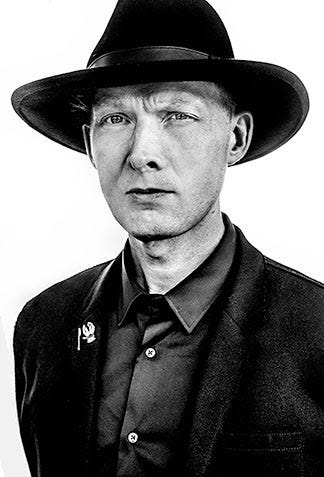The end of what has been the semester from hell
Complex Praxis Email Newsletter for 12/12/20
Hello Friends,
This is the last week of (as I told you last week) what has been the semester from hell. While this is cause for much celebration, it also means I have a massive amount of stuff to get done this week. The result is going to be a shorter version of CP for this week.
I’ve picked up a few new readers over the past to editions of CP. For those of you who are new, here is a short rundown of the different sections of CP.
Hello Friends — You just read that. You get what it is, yeah?
Lacanian Mojo — Where I generally write about something having to do with Lacanian theory or the clinical practice of Lacanian psychoanalysis.
Podcasts — Updates on podcasts I make or listen to.
Writing — Updates on writing projects.
Tools — Things I use. I figure some of you might want to use them too.
Living in the Jackpot? — This section is not in every edition of CP. When it is there, it is about something crazy happening in the world. What’s “the Jackpot,” you ask? It’s “the mundane cataclysm of modernity itself. It is hundreds of millions of people driving to the supermarket in their SUVs, flying six times a year, and eating medicated animals for dinner.” (Quote is from William Gibson, Source & Source)
The Ghosts of My Life — An homage to the late Mark Fisher, where I talk about something from my past that haunts me today. Often this is something like music, books, films, etc. Like the Living in the Jackpot? This is a section that’s not in every edition of CP.
Fin — Where I sign off.
This format changed the longer I’ve been writing. If you want to look into the past, check out the CP Archives.
Now then.
Lacanian Mojo:
Two weeks back, I wrote about the imaginary. Last week I wrote about the symbolic. This week should be about the real… but I don’t have the time (or the mental energy) to take that on this week. What I am going to do is give you a few thoughts I’ve had about the imaginary and the symbolic over the past week.
I get the impression that some people read what Lacanians write about the imaginary and the symbolic. They get the impression that Lacanians think the imaginary and the symbolic are somehow “bad.”
That’s wrong.
The imaginary and the symbolic are awesome, and they help us. We need them.
However, if we are not careful, we might end up being used by the imaginary (identity) and the symbolic (law) instead of making use of them.
Let’s dive into that a bit more:
The way I see it is that having an identity can make life easier. In some instances, it might even make life better. But if we are not careful, identity can become something that we feel we “have to” comply with. An example that I see often is when people who identify as members of a particular group or adherents of a particular ideology feel they can’t be critical of their group/ideology. When something like that happens, one’s imaginary-identity has become more of a cage and less of a tool.
A similar thing can happen with the symbolic-laws. The symbolic is a great tool when we use it to improve the overall quality of our lives and the lives of others. However, if we are not careful, we can become overly reliant upon the symbolic-law (i.e. policy) to solve our problems for us. When this happens we abdicate our personal sovereignty and responsibility, so the symbolic-law becomes something we must comply with.
This is a problem; just because something is “the law” does not mean that it is right, ethical, or moral. At one point in time, segregation was the law, and people who did things like integrate lunch counters were breaking the law.
If someone following the law/policy has ever wronged you, then you can see how the symbolic-law can be used in a perverse way.
My point here:
The imaginary-identity is a powerful tool, and we have to be careful with how we use it.
The symbolic-law is also a powerful, and we need to be as responsible as we can with how we use it.
Podcasts:
I’m far too busy with the end of this semester to do any podcast work. Be that as it may, I’ve got some podcasts brewing that I can’t wait to record and release.
The next episode of InForm: Podcast will probably be built about the question: Does psychoanalysis need to be marginal for it to work? Jared and I have talked about this several times, and we think it might be fun to have the conversation in a more public way.
I have a few ideas for some short episodes of From78. The most well thought out idea is built around the essay title The Ethnographer, by Luis Borges.
Writing:
I wrote about psychoanalytic theory in clinical practice in this book, which just came out.
Here is a snip of text from it:
I’ve been continually immersed in psychoanalytic theory and practice since I first read Freud’s Introductory Lectures to Psychoanalysis (1989) when I began my doctoral studies almost a decade ago. Early on, I was struck by the idea that the unconscious is a constant companion in our lives, for better or for worse, and that through psychoanalytic practice, the unconscious can transform from an undermining presence into, perhaps, a friend that reveals hard but important truths. Today, I’m deeply committed to furthering the psychoanalytic cause by introducing it to people who can use it. The goal of this chapter is to present the essential conceptual components of psychoanalytic praxis (the merging of theory and practice) as I understand them, making them accessible to the student who is beginning his or her journey as a mental health professional. No matter how well-crafted my rendition of these concepts is, the constraints of space will require me to leave deeper exploration on the cutting room floor. What follows here is a collection of starting points and signposts one can use as they move deeper into a psychoanalytic worldview.
Tools:
I’ve been using the fantastical app throughout this hellish hyper-busy semester, and it has become my default calendar application.
I like how it has me enter events, and how it syncs with my iPhone, iPad, and Laptop. It is one of those apps that does something I need (manage a calendar), and it just works. Solid Performance + Simplistic Design = Good.
Living in the Jackpot?
I read this in The Times of London this week.
The French army has been given the go-ahead to develop bionic soldiers resistant to pain and stress and endowed with extra brain power thanks to microchip implants. The approval came from the ethical committee of the armed forces ministry, which said in a report that France needed to keep up with countries that were already working to produce super-soldiers. The committee gave details of some lines of research, including pills to keep troops awake for long periods and surgery to improve hearing. Other areas in the “field of study” involve implants which release anti-stress substances or “improve cerebral capacity.”
I don’t know if The Times of London is what I’d think of as a “real newspaper” or if it is kinda like one of those tabloid sorts of papers we have here in the US that report on Bat-Boy sighting in the New York Subway.
The Ghosts of My Life:
I wrote about how I enjoy ambient music in a prior edition of CP. Lawrence English (Bandcamp page) is one of the ambient musicians whose work I’ve consistently enjoyed, and he recently re-issued two of his early albums: Transit and Happiness Will Befall.
These are beautiful albums.
I wake up early most days (between 5:30 am and 6:00 am), and I use that little bit of time before things turn on to read and stretch. This week, these two albums have been the soundtrack to that time. The effect on me has been great.
I listen to the sounds, which are a mix of music and field recordings English took. I watch the night receded and the day arrive. I start my day in a headspace that I like.
Here is what English says about the albums:
Transit was my first full length solo recording. […] As the title suggests, this is categorically a record about motion, about transitions and about the ways of recognising the lived-in world that is so acutely felt in the earliest years of travelling. During this time, my world view expanded considerably and I was struck by the complexities of the world, the interpersonal relationships people experienced each day, the political intensities that haunted cities (perhaps most clearly captured in the transformed recordings of ultra nationalist speakers on the streets of Tokyo), the dynamic shifts of season (something rather foreign to us antipodeans) and the experiential list goes on.
Happiness Will Befall is [also] a record created in transit. A record made in transitory spaces within which I existed, but which were never truly mine. It sits so starkly in contrast to the lived experience of this year that to revisit it was simultaneously assuring and unsettling.
During the year and a half during which this record was made, I was travelling a great deal. I spent some time in Southern India working on a UNESCO communications project (both Adrift and Relocated were completed during that time), in New Zealand making field recordings and performing, in Singapore curating an exhibition for MAAP and in Adelaide on an artist residency. The record was composed in these unsteady and often blurry moments. I have some vivid memories from this time, finishing Relocated (UTC) at the United Theological Collage in Bangalore is one such example. That memory is so vivid, I can even recall the texture of the light on the walls in my dormitory., revisiting the piece transported me directly back to that time.
If you think you might be interested, you can listen to lots of English’s work on Spotify or Bandcamp.
Fin:
That’s it for this week. Now back to the last of my grading.
Till next week, make some glorious mistakes!
-N




